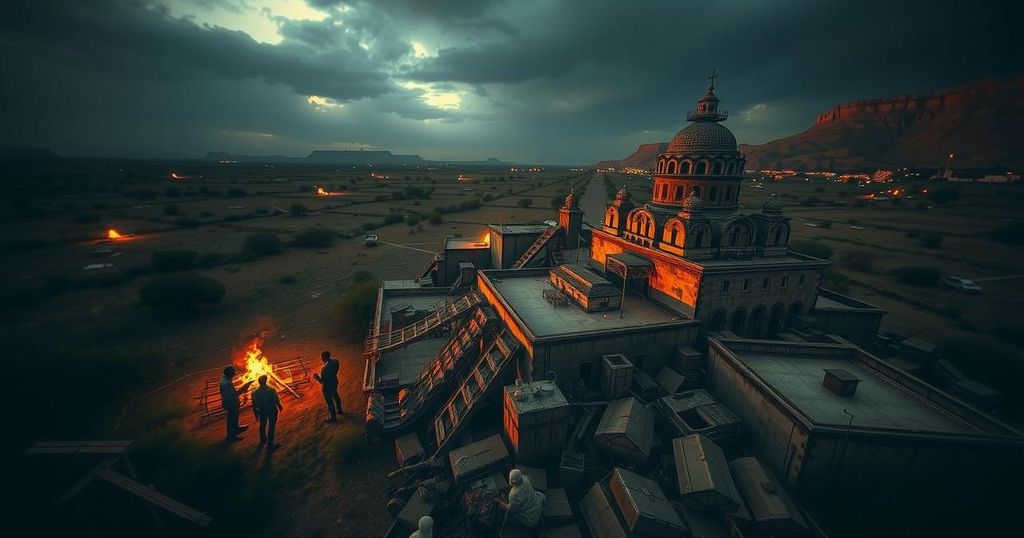South Sudan’s elections, postponed to December 2026, reflect ongoing power struggles between President Salva Kiir and Vice-President Riek Machar. The delay, stemming from inadequate preparation and lack of political will, raises concerns over the nation’s path to democracy. International stakeholders have expressed disappointment, while proposals for a neutral caretaker government emerge as potential solutions to navigate the political impasse.
The ongoing political situation in South Sudan reflects a dire reality for the nation, now seen as a prolonged ‘game of thrones’ between powerful leaders. The much-anticipated elections, originally set for December 2023, have been postponed again to December 2026, following a lack of progress in the transitional government led by President Salva Kiir and Vice-President Riek Machar. This delay raises serious concerns regarding the prospects for democracy in Africa’s youngest nation, as both leaders seem reluctant to cede power in favor of electoral legitimacy.
The 2018 peace agreement intended to guide the nation out of conflict has instead faced significant setbacks, primarily attributable to insufficient political will and resources, alongside a pervasive trust deficit. Major General Charles Tai Gituai emphasized the urgency for the transitional government to adopt a new approach in mobilizing the necessary resources for implementing the agreement, underscoring an apparent disregard for accountability by those in power.
Nicholas Haysom, a senior UN representative, noted that political interests have continually overshadowed the pressing need for elections, resulting in a regrettable action to delay the polls again. Disappointment echoed through the troika of supportive nations—the United States, United Kingdom, and Norway—who criticized South Sudan’s leadership for maintaining an entrenched elite while neglecting the needs of the populace.
Conversely, African Union officials called for practical steps to affirm the 2018 agreement, signifying a divide in reactions to the postponement. Efforts to integrate various factions into the transitional government have stalled, further complicating the dynamics as essential peace negotiations falter. Despite calls for compromise, the likelihood remains low that Kiir and Machar will take meaningful action to facilitate elections.
Amidst concerns about the technical readiness for elections in 2026, experts have highlighted the need for constitutional reforms and a census, both of which are unlikely to materialize under current circumstances. Compounding these issues, the ongoing civil conflict in Sudan presents additional economic challenges impacting South Sudan’s ability to manage its electoral process, indicating a precarious political climate.
As the situation unfolds, proposals for a neutral caretaker government emerge as a potential pathway to effectively oversee the elections, albeit reliant on the contentious agreement of current political leaders. Overall, the future of democracy in South Sudan appears contingent on overcoming entrenched political disputes and addressing critical governance failures.
South Sudan, having gained independence in 2011, has faced severe challenges in establishing a stable and democratic governance system. The political landscape has been dominated by a power struggle between President Salva Kiir and Vice-President Riek Machar, exacerbating national tensions and hindering the implementation of peace agreements. Key to the political transition is the 2018 peace agreement aimed at ending years of civil conflict, yet execution has been plagued by delays and a lack of genuine political will from the leadership. This context is crucial for understanding the implications of the delayed elections and the ongoing quest for stability within the nation.
The postponement of elections until December 2026 symbolizes a critical juncture in South Sudan’s political journey. The reluctance of leaders to transition to a democratic process coupled with logistical challenges raises considerable doubts about the nation’s readiness for fair elections. Calls for serious compromises and structural reforms highlight the urgent need for a commitment to governance that prioritizes citizens’ welfare over entrenched political battles. Moving forward, the engagement of neutral entities in the electoral process may offer a glimmer of hope for overcoming this entrenched political impasse and fostering a more democratic future for South Sudan.
Original Source: www.eurasiareview.com







